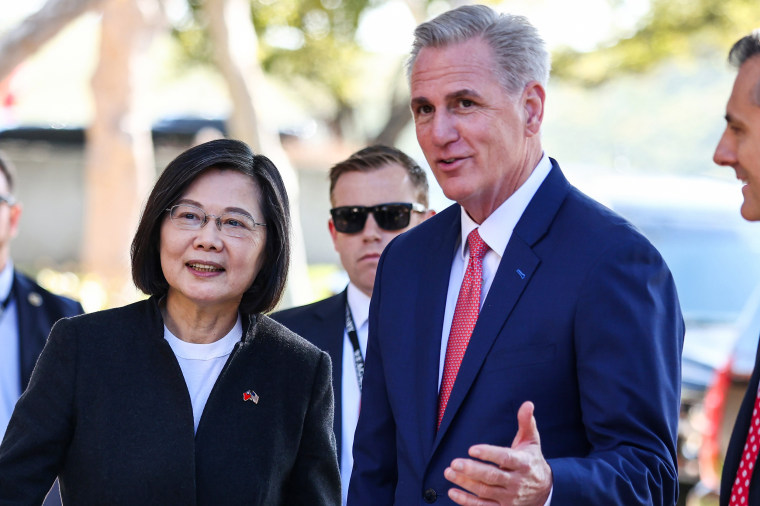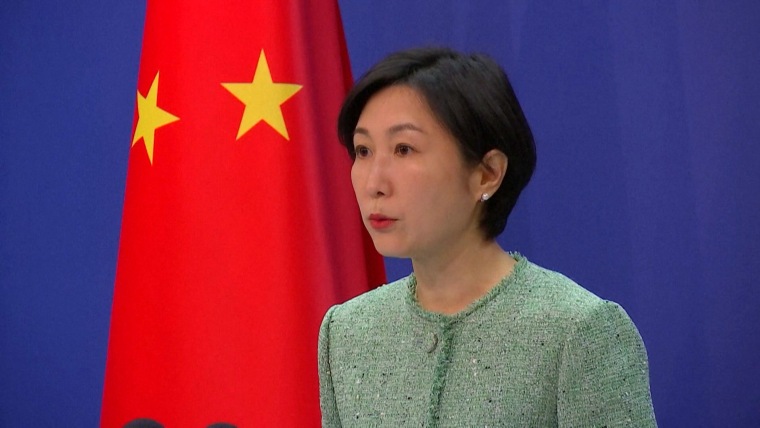[ad_1]
House Speaker Kevin McCarthy met with Taiwanese President Tsai Ing-wen in Southern California on Wednesday, promising unwavering support for Taiwan and praising bipartisan cooperation on China, amid worsening Beijing-Washington tensions.
The meeting, which took place at the Ronald Reagan Presidential Library, occurred despite threats of retaliation from China, which views the exchange as a show of support for Taiwan’s independence.
“I believe our bond is stronger now than at any time or point in my lifetime and of course, President Tsai is a great champion of that bond,” McCarthy told reporters after the meeting.

Tsai said it was fitting the two leaders came together at the Simi Valley library honoring Reagan, whose administration was instrumental in securing assurances between the U.S. and Taiwan in 1982.
That continued support assures “the people of Taiwan that we are not isolated and we are not alone,” Tsai said, but added that democracy in Taiwan is once again under threat.
“We once again find ourselves in a world where democracy is under threat and the urgency of keeping the beacon of freedom shining cannot be understated,” she said.
Tsai’s visit to California is part of a larger tour through the United States and follows a trip to Guatemala and Belize.
When asked whether McCarthy would visit Taiwan, the speaker said he didn’t currently have plans, “but that doesn’t mean I will not go.”
Joining McCarthy in meeting with Tsai was a bipartisan group of more than a dozen lawmakers, including Rep. Pete Aguilar, D-Calif., who is a member of House Democratic leadership, and the top Republican and top Democrat on the House’s new China select committee.
McCarthy praised the bipartisanship approach to Taiwan and China, crediting Rep. Hakeem Jeffries, the top Democrat in the House who met with Tsai last month in New York, and other Democrats for their ongoing work on the China committee.
Chinese officials have criticized the sit-down as a “provocation” and a violation of the one-China principle, under which Washington recognizes Beijing as the sole legitimate government of China while maintaining unofficial relations with Taipei.
China’s ruling Communist Party claims sovereignty over Taiwan, a self-governing island democracy, despite never having controlled it. Ahead of the Tsai-McCarthy meeting, China said it would “resolutely defend” its territorial integrity.
Outside the library Wednesday, more than one hundred people gathered in dueling protests between supporters of Taiwan and of China. A plane circled overhead carrying a sign that read “Taiwan is a part of China.”
Earlier, the Maritime Safety Administration of Fujian province, which sits about 100 miles across the water from Taiwan, said on its official WeChat account Wednesday that it had begun a joint cruise and patrol operation in the Taiwan Strait.
Taiwan also said Wednesday that it had detected 14 Chinese military planes and three Chinese military vessels near the island, two of the planes entering Taiwan’s self-declared Air Defense Identification Zone in what is a near-daily occurrence.
Before leaving Belize for the U.S. on Tuesday, Tsai held a video conference with security officials in Taiwan to discuss the regional situation, her office said. Earlier this week, a spokesperson for Tsai said it was “the right of the 23 million Taiwanese people to have exchanges with democratic countries.”
“There is no room for China to comment,” the spokesperson added.
The White House says that visits by high-level Taiwanese officials are routine and that China should not use Tsai’s travel through the U.S. as a “pretext” for greater aggression against Taiwan.
“Beijing should not use the transits as an excuse to take any actions to ratchet up tensions, to further push at changing the status quo,” Secretary of State Antony Blinken said Wednesday.
Chinese Foreign Ministry spokesperson Mao Ning contended: “Repeating a mistake does not make it legitimate. The issue is not about China overreacting, but the U.S. egregiously conniving at and supporting ‘Taiwan independence’ separatists.”
Tsai’s meeting with McCarthy comes after a stop in New York, where she met with Jeffries, as well as a bipartisan group of members of the Senate Armed Services Committee.
The Tsai-McCarthy meeting is “actually a win-win-win” for China, Taiwan and the U.S., said Lev Nachman, a political scientist and assistant professor at National Chengchi University in Taipei.
It’s a win for China, he said, because McCarthy is not following in the footsteps of his predecessor, Nancy Pelosi, by traveling to Taiwan — at least for now. China responded to Pelosi’s visit last August, the first by a sitting House speaker in 25 years, with unprecedented live-fire military drills.
Taiwan, which is regularly visited by lawmakers from the U.S. and elsewhere, is seen as having successfully postponed a trip by McCarthy, who “listened and actually was able to respect what Taiwan thought was best for itself right now,” Nachman said.
But the U.S. also benefits, he said, “because McCarthy still gets to say that he met with the Taiwanese president.”
As Tsai arrived at her hotel in downtown Los Angeles on Tuesday night, she was greeted by supporters waving Taiwanese flags and photos of her, as well as a smaller group of pro-China demonstrators.
Former Taiwanese President Ma Ying-jeou, whose opposition party favors closer ties with Beijing, is also still in China on a historic 12-day visit. Chinese aggression in response to the Tsai-McCarthy meeting could erode support for Ma’s party, the Kuomintang, ahead of a presidential election in Taiwan early next year.
Tsai is scheduled to return to Taiwan on Friday.
Jenn Jett reported from Hong Kong, Alicia Victoria Lozano reported from Los Angeles and Aarne Heikkila reported from Simi Valley, California.
[ad_2]
Source link

